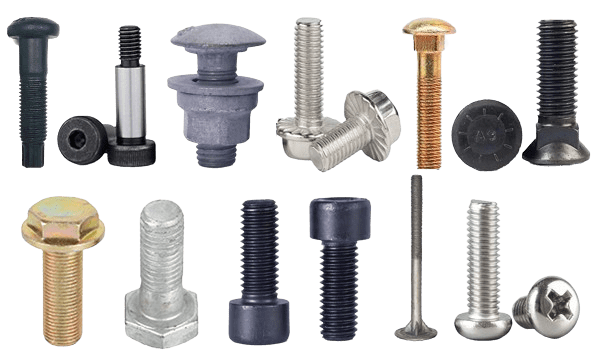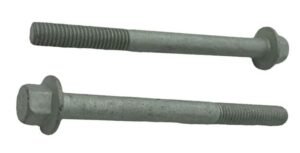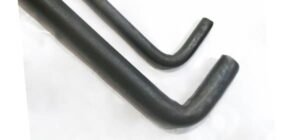
Are you confused by all the different types of bolts out there? I get it. As someone who runs a fastener company, I know it can be overwhelming. Let me break it down for you.
**In the world of bolt fasteners, there are many types classified by their head style and intended use. Some of the main types include:
- Hex Bolts
- Hex Cap Screws
- Shoulder Bolts
- Hex Tap Bolts
- Heavy Hex Bolts
- Heavy Hex Structural Bolts
- Hex Flange Bolts
- Square Head Bolts
- Tower Bolts
- Step Bolts
- Carriage Bolts
- T-head Bolts
- Threaded Bar/Threaded Rod
- Timber Bolts
- Headed Anchor Bolts
- Plow Bolts
- U Bolts
- Lifting Eye Bolts
- Eye Bolts
- Button Head Screws
- Hanger Bolts
- J-Bolts
- Elevator Bolts
- Wheel Bolts.
Hex bolts and hex cap screws are among the most common types, easily recognizable by their six-sided heads. They are versatile and used in a wide range of applications, from securing heavy machinery to basic construction tasks. Shoulder bolts, on the other hand, have a smooth, unthreaded section beneath the head, making them ideal for use as pivot points
Let’s delve into the details of these bolts and answer some critical questions to enhance your understanding of the types and uses.

What Are the Three Types of Threaded Fasteners?
Threaded fasteners are essential in many applications, and they are generally categorized into three types:
- Screws – Screws are versatile fasteners used to hold things together in wood, metal, and plastic materials. They come in various types, such as machine screws, wood screws, and self-tapping screws.
- Nuts – Nuts are used in combination with bolts to hold components together. They are available in different shapes and sizes, including hex nuts, lock nuts, wing nuts, and cap nuts.
- Bolts – Bolts are similar to screws but are typically used with a nut. They are designed to be inserted through pre-drilled holes and secured with a nut. Examples include hex bolts, carriage bolts, and lag bolts.
What Are the 4 Main Types of Threads Used on Fasteners?
Understanding the types of threads on fasteners is crucial for selecting the right one for your needs. Here are the four main types:
- Metric Threads – Also known as ISO Metric or simply “M” threads, these are utilized worldwide and come in coarse and fine pitches.
- Unified National Coarse (UNC) – Common in the United States, UNC threads are used for general-purpose fastening and are coarser than UNF threads.
- Unified National Fine (UNF) – Also popular in the United States, UNF threads are used where higher tensile strength is needed and are finer than UNC threads.
- British Standard (BS) Threads – This category encompasses British Standard Whitworth (BSW) and British Standard Fine (BSF). These older thread standards are still used in some applications but are being phased out in favor of metric threads.

What Are Grade 5 Fasteners?
Grade 5 fasteners are medium-strength fasteners with specific characteristics:
- Material: Made from medium carbon steel that has been quenched and tempered (heat treated) to increase strength.
- Strength: They offer a balance between strength and cost, being stronger than Grade 2 fasteners but not as strong as Grade 8.
- Identification: Marked with three radial lines on the bolt head.
- Size Range: Typically available from 1/4 inch to 1 1/2 inches in diameter.
Mechanical Properties:
- Proof Load: 74,000 to 85,000 psi
- Minimum Yield Strength: 81,000 to 92,000 psi
- Minimum Tensile Strength: 105,000 to 120,000 psi
Applications:
Applications of Grade 5 fasteners include automotive and construction industries, where a good balance of strength and cost is required.
Benefits:
- Increased strength and durability
- Good corrosion resistance (often zinc-plated)
- Wide availability
- Good price-to-strength ratio
Potential Limitations:
- May not be strong enough for extremely high-strength applications
- Can be more difficult to work with than lower-grade fasteners due to increased hardness
Grade 5 fasteners are popular in many industrial and automotive applications due to their balance of strength, cost, and availability.

How to Identify Bolt Grade?
Identifying bolt grades is essential for ensuring the correct application. Here’s how you can identify the grades:
- Grade 2 Bolts: They may have no markings or sometimes a manufacturer’s mark.
- Grade 5 Bolts: Look for three evenly spaced radial lines on the head.
- Grade 8 Bolts: They will have six evenly spaced radial lines on the head.
- Metric Bolts: Usually, the strength class number is stamped on the head, such as 8.8, 10.9, and 12.9.
- Stainless Steel Bolts: Look for markings like “A2” or “A4”, and they usually have a dull appearance without plating.
US standard bolts are typically marked with two fewer radial lines than its corresponding grade. For, example, Grade 5 bolt has three lines, and Grade 8 has six lines. In addition, high-strength bolts may also include the manufacturer’s marking on the head.
By checking these markings, you can determine the strength and suitability of the bolt for your needs.
What Is M6 Bolt Size?
An M6 bolt is a metric fastener with the following specifications:
- Diameter: 6 mm
- Thread Pitch: 1.0 mm (standard coarse thread)
- Length: Varies, commonly available in lengths from 10 mm to 80 mm or more, measured from under the head to the end of the bolt.
M6 bolts are commonly used in various applications, including machinery, automotive, and construction, due to their standard size and versatility.
Conclusion
When it comes to fasteners, understanding the various types and specifications of bolts can help set you up for success in your projects. From hex bolts to shoulder bolts, understanding thread types and grades can make a significant difference in the strength and durability of your assemblies. At FMW Fasteners, we work hard to provide high-quality fasteners that meet your project requirements — and we have the expertise and product selection to support you in any industry, whether you need fasteners for automotive, construction, or just about anything else.
For more detailed information and resources, check out Bolt and Screw.
Shop our selection or contact us for the fasteners you need.






